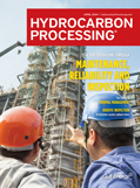Aromatics
Hydrocarbon Processing 2020 Awards WINNERS
<i>Hydrocarbon Processing</i>, the downstream processing sector’s leading technical publication, has announced the winners for its third annual awards.
Hydrocarbon Processing Awards 2020—FINALISTS
This special section details all finalists within each category for the fourth annual <ital>HP</ital> Awards. The winners will be announced on Oct. 1.
Catalytic processes operation during downturns in aromatics complexes
Paraxylene production is a highly cyclical business that is subject to changes in the global economy and dependent on feedstock costs, alternative dispositions for aromatics, utilities costs and plant locations, among other factors. With the large PX capacity added by recently started crude-to-chemicals complexes and the expected impact of the economic recession on commodities demand, many aromatics complexes face a significant slowdown in the coming months or, possibly, years.
Best practices for aromatics extractive distillation in integrated complexes
Integrated refining/aromatics/olefins complexes are an efficient and effective configuration to maximize crude oil feedstock value and optimize the value of the entire product chain.
Business Trends
Rovuma LNG, a JV comprised of ExxonMobil, Eni and China National Petroleum Corp., will likely delay its final investment decision (FID) on the group’s $30-B Mozambique LNG project.
Root cause analysis for low yield of p-diethylbenzene produced by catalytic alkylation
Reliance Industries Ltd. (RIL) manufactures para-diethylbenzene (PDEB) at one of its plants by alkylation of ethylbenzene (EB) with ethylene, using RIL's own technology and super-selective catalyst.
Circular economy: Getting in the door of opportunity ahead of a vanishing polymer market
Significant change is coming to the hydrocarbons industry. Up to 43% of the global conventional polymer production expected by 2040 may disappear due to circular economy (CE) initiatives. In addition, due to the growth in wind turbines and solar panels, and in lightweight composite materials in cars and planes, advanced materials waste is just beginning.
A new liquid-phase isomerization process for xylene loop debottleneck and energy savings
In a typical xylene loop, C<sub>8</sub> aromatics are fractionated out of a heavy reformate C<sub>8</sub>+ aromatics stream and collected in the xylene column overhead. Then, paraxylene (PX) from the C<sub>8</sub> aromatics stream is recovered as product—usually by an adsorption or crystallization process—in the PX recovery section.
IMO 2020 stability and compatibility headaches
The year 2020 will be a mess from the fuel oil stability and compatibility points of view. The year will be price-driven, so the temptation to “cut corners” is great—meaning that a highly variable number of blend components to manufacture the fuel oil will open a “Pandora’s box” of complex and questionable fuel formulations.
Construction
Total plans to take a final investment decision (FID) on the Nigeria LNG expansion project by the end of this year. If greenlighted, the 7-MMtpy LNG train would increase the Bonny Island LNG terminal’s capacity to nearly 30 MMtpy. If built, Train 7 is expected to be operational by 2023.

- Vertex Energy pauses renewable diesel output to switch back to fossil fuels, citing macroeconomic woes 5/10
- Citgo Petroleum reports Q1 profit of $410 MM 5/10
- Golden Pass LNG in discussions with contractor, may delay startup 5/10
- SAFFiRE Renewables biofuel pilot plant to be developed in Kansas 5/10
- EBRD backs Ukraine's green biofuels project with €60-MM loan 5/10
- Russia's refined oil product exports to Singapore to hit highest this year in May 5/10




